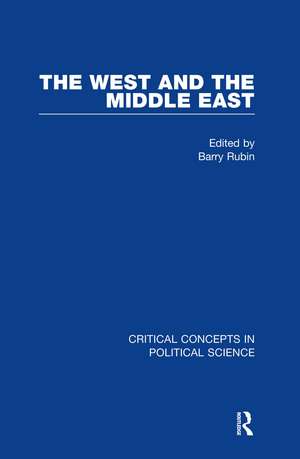The West and the Middle East: Critical Concepts in Political Science
Editat de Barry Rubinen Limba Engleză Hardback – 18 oct 2010
All of these factors have greatly increased interest in the West toward its engagement in the region and the need for good materials explaining the history, the strategies, events, and ideas. This new title in the Routledge Major Works series, Critical Concepts in Political Science, meets the need for an authoritative reference work to answer these and other questions, and to enable users to make sense of the subject’s vast literature and the continuing explosion in research output.
Din seria Critical Concepts in Political Science
- 34%
 Preț: 5212.31 lei
Preț: 5212.31 lei - 34%
 Preț: 5929.91 lei
Preț: 5929.91 lei - 34%
 Preț: 5226.18 lei
Preț: 5226.18 lei - 34%
 Preț: 4752.83 lei
Preț: 4752.83 lei - 34%
 Preț: 4540.12 lei
Preț: 4540.12 lei - 34%
 Preț: 4939.47 lei
Preț: 4939.47 lei - 34%
 Preț: 5499.64 lei
Preț: 5499.64 lei - 34%
 Preț: 5208.29 lei
Preț: 5208.29 lei - 34%
 Preț: 3960.26 lei
Preț: 3960.26 lei - 34%
 Preț: 4377.30 lei
Preț: 4377.30 lei - 34%
 Preț: 5633.96 lei
Preț: 5633.96 lei - 34%
 Preț: 6186.86 lei
Preț: 6186.86 lei - 34%
 Preț: 6741.21 lei
Preț: 6741.21 lei - 34%
 Preț: 7868.87 lei
Preț: 7868.87 lei - 34%
 Preț: 7318.32 lei
Preț: 7318.32 lei - 34%
 Preț: 7318.72 lei
Preț: 7318.72 lei - 34%
 Preț: 7295.48 lei
Preț: 7295.48 lei - 34%
 Preț: 7301.60 lei
Preț: 7301.60 lei - 34%
 Preț: 4237.71 lei
Preț: 4237.71 lei - 34%
 Preț: 6743.26 lei
Preț: 6743.26 lei - 34%
 Preț: 6739.59 lei
Preț: 6739.59 lei
Preț: 5348.23 lei
Preț vechi: 8091.78 lei
-34% Nou
Puncte Express: 8022
Preț estimativ în valută:
1023.36€ • 1068.48$ • 846.98£
1023.36€ • 1068.48$ • 846.98£
Comandă specială
Livrare economică 14-28 martie
Doresc să fiu notificat când acest titlu va fi disponibil:
Se trimite...
Preluare comenzi: 021 569.72.76
Specificații
ISBN-13: 9780415563901
ISBN-10: 0415563909
Pagini: 1696
Dimensiuni: 156 x 234 x 112 mm
Greutate: 3.06 kg
Ediția:1
Editura: Taylor & Francis
Colecția Routledge
Seria Critical Concepts in Political Science
Locul publicării:Oxford, United Kingdom
ISBN-10: 0415563909
Pagini: 1696
Dimensiuni: 156 x 234 x 112 mm
Greutate: 3.06 kg
Ediția:1
Editura: Taylor & Francis
Colecția Routledge
Seria Critical Concepts in Political Science
Locul publicării:Oxford, United Kingdom
Cuprins
Volume I: Issues in Europe-Middle East Relations Part 1: US-Europe and Middle East Part 2: The Euro-Mediterranean Partnership: Trade and Development Part 3: The Iran Issue Part 4: Maghreb Relations Part 5: Security Issues Volume II: Country Studies in Europe-Middle East Relations Part 6: Central Europe Part 7: France
Part 8: Germany Part 9: Greece Part 10: Italy Part 11: Norway Part 12: Spain Part 13: UK Part 14: Bilateral Relations Volume III: U.S.-Middle East, Issues in Relations Part 15: Overviews Part 16: U.S.-Israel Part 17: Arab-Israeli Conflict and the Peace Process Part 18: Arab Perceptions of America Part 19: Economic Policy Part 20: Iran and America Volume IV: U.S.-Middle East: Sub-Regions and Events Part 21: The Iraq War Part 22: North Africa Part 23: Persian Gulf Part 24: September 11 and War on Terrorism
Part 8: Germany Part 9: Greece Part 10: Italy Part 11: Norway Part 12: Spain Part 13: UK Part 14: Bilateral Relations Volume III: U.S.-Middle East, Issues in Relations Part 15: Overviews Part 16: U.S.-Israel Part 17: Arab-Israeli Conflict and the Peace Process Part 18: Arab Perceptions of America Part 19: Economic Policy Part 20: Iran and America Volume IV: U.S.-Middle East: Sub-Regions and Events Part 21: The Iraq War Part 22: North Africa Part 23: Persian Gulf Part 24: September 11 and War on Terrorism
Descriere
Why is the Middle East the only part of the world which has drawn the West into wars in the last thirty years? With a sequence of events since 1945, including the Six-Day War, the Iranian revolution, the Iran-Iraq war, and the two Gulf wars, the Middle East has been the most important region of diplomacy, crisis, and controversy for the West. More recent events - notably the 2001 attack on the United States but also a number of other events (Afghanistan, Iraq, Somalia, nuclear proliferation, oil) - have even further escalated both engagement and debate. This has been punctuated by large-scale immigration to the West from the region. Islamism is the only ideology that challenges the dominant, globalizing, modern form of society.
All of these factors have greatly increased interest in the West toward its engagement in the region and the need for good materials explaining the history, the strategies, events, and ideas.
All of these factors have greatly increased interest in the West toward its engagement in the region and the need for good materials explaining the history, the strategies, events, and ideas.
